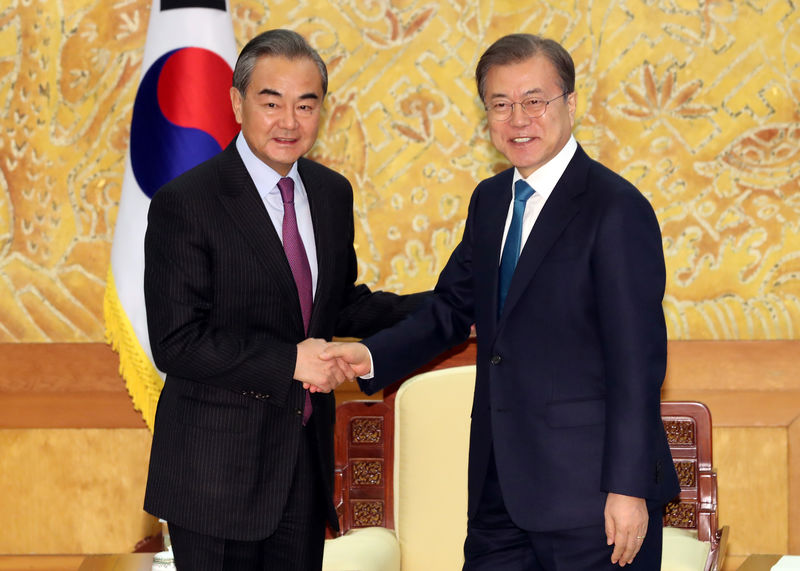By Sangmi Cha
SEOUL (Reuters) - A senior China diplomat offered conciliatory remarks to South Korean President Moon Jae-in on Thursday amid efforts to repair ties strained by a U.S. anti-missile system, while leveling sharp criticism at the United States for "Cold War" thinking.
State Councillor Wang Yi, who is also China's foreign minister, met with Moon on the final day of a two-day visit to Seoul, his first in four years. Relations between the two countries have been strained by South Korea's installation of a U.S. Terminal High Altitude Area Defense (THAAD) system in 2017.
"We agree to deal with THAAD and other issues properly so we can earnestly respect each other's core interests," Hua Chunying, spokeswoman for the Chinese foreign ministry, said during a briefing in Beijing.
But Wang sharply criticized the United States over THAAD in remarks to a lunchtime gathering of South Korean business people and former government officials in Seoul.
"The U.S. made it to target China," Wang said, according to South Korea's Yonhap news agency. A "Cold War way of thinking" is out of date and "hegemony cannot win people's hearts", he said.
"China's revival is inevitable in history and no one can stop it," he said at the lunch, which was organized by the Chinese embassy in Seoul.
Moon, meanwhile, asked Wang for Beijing's help to "reach a nuclear-free, peaceful peninsula" as tensions with North Korea rise.
"A close dialogue and cooperation between the two countries will help to stabilize Northeast Asia's security and overcome the uncertainty the global economy is facing," Moon said.
South Korea sees China as instrumental in reviving the stalemated nuclear talks between the United States and North Korea, a longtime ally of Beijing.
Denuclearization negotiations between North Korea and the United States reached stalemate after a working-level meeting in Stockholm broke down in October.
On Wednesday, Wang met South Korean Foreign Minister Kang Kyung-wha and agreed to hold the first gathering of a planned joint vice-ministerial panel on people-to-people exchanges "in the near future" and create a new meeting on maritime affairs, South Korea's foreign ministry said in a statement.

Kang and Wang also agreed to cooperate to facilitate negotiations with North Korea based on the shared view that its nuclear programs cannot be accepted, peace should be maintained and there must not be war again, a South Korean foreign ministry official told reporters.